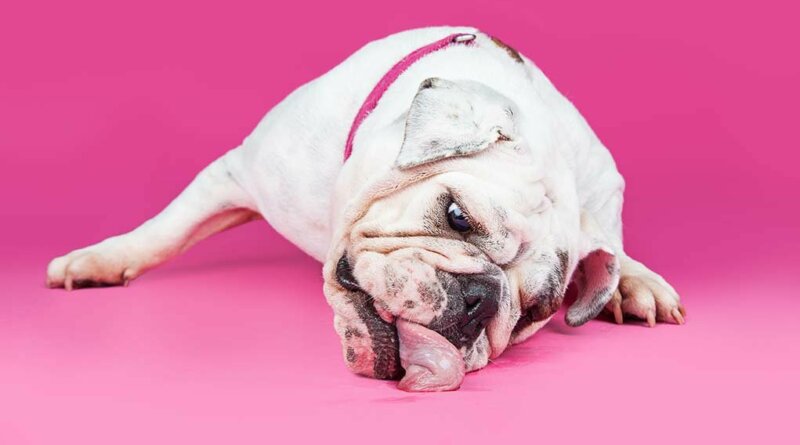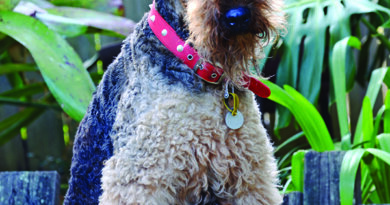Reasons Why and What You Can Do About It
Your dog’s strange behavior can sometimes be a cause for concern. If your dog licking carpet for no apparent reason is a new thing, this is something you should look into. Below we’ll discuss why dogs lick carpets and if it should be considered a problem as far as your pet’s health is concerned, and how to discourage this undesirable behavior.
In this article we will discuss the following:
- Why is my dog licking the carpet?
- What is Excessive Licking Syndrome (ELS)?
- Other explanations for a dog licking the carpet
- Is it harmful for my dog to lick the carpet?
- How can I stop my dog from licking the carpet?
Why Is My Dog Licking Carpet?
Dogs lick different kinds of surfaces all of the time and it is usually not a cause for concern. They could be sampling something tasty that was spilled on your carpet previously, and long after the substance has gone.
Dogs also analyze the world around them this way. They lick things in order to smell what has been going on in the environment before to understand it better.
For example, if you are taking your dog for a walk and he stops to lick a wall, you might think it seems odd, but the dog is probably bringing the scent of dried dog pee back to life with a bit of moisture so that he can inhale the scent and get all of the information he needs about the other dog who left it.
If you have other animals in your house, or you have installed a second-hand carpet or rug that previously belonged in a house where there were animals, chances are that your dog is digging up information. Animals like to leave their scent everywhere – by peeing, eliminating, spraying and rubbing their scent glands on surfaces.
However, if your dog is licking a carpet excessively, and not simply sampling a few scents here and there, they may be suffering from something called Excessive Licking Syndrome or ELS. Keep reading the find out more about this condition.
What is Excessive Licking Syndrome (ELS) in Dogs?
There are some dogs who are such dedicated floor-lickers that vets have actually coined a term to refer to the problem. Dogs who suffer from ELS or Excessive Licking Syndrome will not only lick carpets, but they will lick all kinds of surfaces. It is a dog’s compulsive behavior, which can be distressing for dog owners to observe.
If you regularly witness your dog licking floors, walls, furniture and any other surface they can get their tongues on, you may have cause to be worried about your pet. The kind of licking you are looking out for is obsessive licking, and not simply isolated incidents.
Most common causes of excessive licking in dogs include:
- Allergies
- Dry Skin
- Infections
- Parasites
- Aches and Pains
- Boredom and Anxiety
- Hormonal Imbalances
- Dental Disease
- Neurological Problems
- Hunger or dehydration
- Anal Sac Issues
- Gastrointestinal Illness
ELS in dogs needs to treated according to the cause. Before you begin the treatment, you’ll need to discuss this either with your veterinarian or canine behaviorist to figure out the underlying cause of your pup’s excessive licking syndrome.
Some examples of addressing excessive licking in your dog:
If it’s parasites – use OTC treatments to get rid of fleas or ticks on your dog, wash your pet with medicated shampoo, treat their beds and crates, and vacuum and clean out the house to remove all parasites from your home.
If it’s allergies – you’ll need to discuss a change of diet with a vet and switch your pet to a different dog food brand, potential with novel protein, to remove allergens that cause excessive licking. Sometimes, your dog may need to be put on the elimination diet to rule out the exact ingredients that cause allergies.
If it’s anxiety – use different methods to calm your dog down and ease your pet’s anxiety. Increasing the amount of exercise, playtime and daily walks should be your first approach; obedience training and agility training can be of great help, too. Toys for anxiety will help, as well as other tools such as anxiety vests and calming collars.
If it’s other reasons – other than the above, there could be many other causes of ELS in dogs, which your veterinarian will tell you about. You may need preventative treatments such as repellent sprays to prevent your dog from licking certain areas, or change up grooming products you’re using. For more serious causes, the dog may need medications, hormonal supplements and sometimes even surgery.
Other Reasons for Your Dog Licking the Carpet
If you have established that nothing tasty has been spilled on your carpet, no other animals have peed anywhere, and your dog’s licking is a new thing and cannot to be attributed to ELS, then here are some other explanations for a dog licking carpet.
Separation Anxiety
If your dog only seems to exhibit the licking behavior when they are left alone, and you only find out about it when you return home to discover a big wet patch on your carpet that doesn’t smell of urine, the behavior could be caused by separation anxiety.
A dog’s emotional pain can manifest itself in a variety of different ways.
Some dogs relieve their tension by becoming destructive in the house, making a mess, urinating, scratching on doors and walls, and chewing on furniture. Other dogs resort to howling or barking. If your dog is obsessively licking in your absence, it may be because they are anxious that you are not going to come back.
Boredom or Depression
When a dog is bored, they usually find ways to entertain themselves. Licking a carpet may be the way your pooch simply passes the time when they are suffering from boredom or apathy, because you’re not paying them enough attention.
Some dogs can even get seriously depressed. Both physical and neurological pain can be expressed with extended periods of time engaging in a seemingly mundane activity, such as chewing or licking the carpet.
Gastrointestinal Disease
A study in 2008 showed a strong link between ELS and gastrointestinal disease. Your dog could be suffering in silence from a serious medical condition, such as Irritable Bowel Syndrome (IBS) or Chronic Pancreatitis, which leads your dog to lick carpet or other surfaces.
Is It Harmful for My Dog to Lick the Carpet?
Licking the carpet by itself, in most cases, is not something that will really harm your dog, but it could be a sign that there is a more serious underlying problem, which may be the cause for concern.
In most cases, dogs don’t do weird things for no reason at all. If your pet is suffering from any of the afflictions described above, then yes, it is harmful for your dog to continue licking the carpet because this behavior needs to be addressed, and you must get to the bottom of the issue.
That said, the actual act of licking the carpet can, in certain instances, be harmful for your dog, regardless of why they are doing it. For example, the texture of the carpet surface could be irritating your dog’s tongue, mouth or teeth, causing sores and open wounds that can become infected. This could result in your dog losing their appetite, becoming dehydrated, losing weight and having their immune system affected, leaving them vulnerable to all kinds of other health problems.
Alternatively, your dog may be ingesting fibers from the carpet that may congeal in the stomach causing hairballs and the risk of blockages and other infections.
How Can I Stop My Dog from Licking Carpet?
The only way to stop your dog from licking the carpet is to first work out the reason why they are doing it. Once you narrow the problem down, visit to your vet with whom you will be able to eliminate the more serious potential causes.
Assuming that your dog doesn’t need medical help, here are some ideas to help you find a solution to the potential behavioral causes of your dog’s odd habit.
1. Prevent Boredom By Providing Routine & Structure
The best way to prevent boredom in dogs is to add routine and structure to your dog’s day so that they know what to expect from you, what they ought to be doing, and when.
Set food times, set playtime, set times for walks, and set times to settle in for the night are the basic things that should be established for your dog. Dogs are like children. They need structure and routine, and it’s a simple way to fix many “bad” behaviors.
2. Exercise Your Dog More and Play More
A well-exercised dog will come back home and all he will be fit for is a nap.
Not all dogs are built the same. Some dogs will need more exercise than others, especially active dogs and working breeds that are bred to be energetic for most of the day. Physical exercise is important for your dog’s health and well-being, so look into your dog’s breed for some insight into what they might be missing out on.
3. Provide Your Dog With Mental Stimulation
Walking the dog is an important activity that provides your dog not only with bathroom breaks but also mental stimulation. If you are unable to provide your dog with this, why not consider hiring a professional dog walker to do the job for you?
You can also provide mental stimulation on walks and in the home with short training sessions. Basic obedience training is great, as well as fun tricks and games, because they all work your dog’s brain. This leads to a tired, satisfied and highly fulfilled dog that has done some work and deserves his rest.
More mental stimulation can be provided with the use of specific stimulation toys, chew toys, raw meaty bones, and treat-filled frozen KONG toys. If your dog is licking a frozen treat or chewing on a bone, he is not licking your carpet.
4. Challenge Your Dog
Is your dog a spoiled pet? Did you know that it is very healthy for a dog to be given plenty of boundaries? The more boundaries your dog has, the happier your dog will be because he will have more to think about, and it all comes back down to routine.
Boundaries include things like creating invisible borders in your home by having areas that your dog isn’t allowed to roam in or through. This creates the illusion of territory, which helps the dog understand the world around them better.
You can make them wait patiently by the kitchen door for their food while you prepare it, and then wait as you put it down for the dog. Practicing self-restraint and impulse control is a great mental exercise for dogs.
READ NEXT: Dog Eating Sticks – Why and What to Do





buy prescription drugs from india: cheapest online pharmacy india canadian pharmacy india